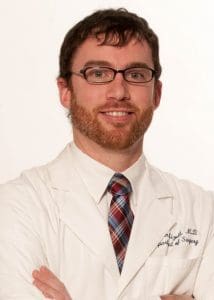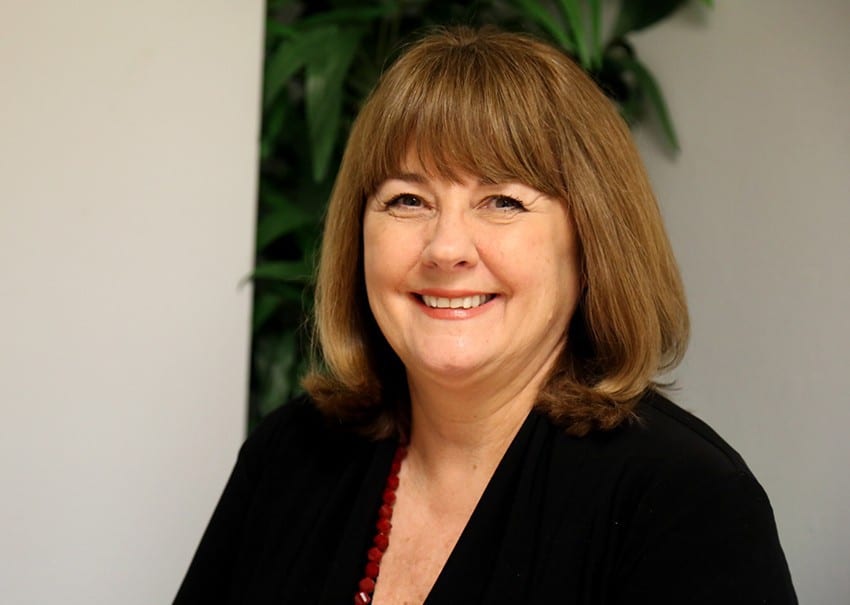Now Cancer-Free, Nurse Regrets Skipping Colonoscopy
| March 28, 2016 | As a nurse, Beverly Seaberg spends her time at work caring for patients. As a wife and mother, she also makes sure her husband, John, and two daughters, Cori and Caroline receive the best health care possible. Seaberg, 58, is an R.N. in the Quality Management department at UAMS. She has worked as a nurse for 35 years. Seaberg had a clean bill of health and is generally very good about taking preventive health measures.

Beverly Seaberg says she was most concerned about her family when she received her cancer diagnosis. She’s pictured here with daughters Cori and Caroline and husband, John.
“I got a mammogram, a pap smear, my teeth cleaned,” Seaberg said. “I took my husband to get his colonoscopy, carried my daughters to the doctor and even took the dogs to the vet.” When she turned 50, the nurse scheduled herself a colonoscopy. “I ended up canceling that appointment,” Seaberg said. “Now I can’t even remember why.”
Five years later, September 2013, Seaberg began experiencing abdominal pain and loss of appetite. She went to her primary care physician thinking it was a bladder infection. By November, her symptoms worsened and her doctor ordered a CT scan. “The scan came back showing I had a mass in my colon. That’s when I found out I had colon cancer and needed surgery.” Seaberg has no family history of colon cancer.
While she knew the importance of colonoscopies, Seaberg says the thought of being diagnosed with colon cancer was never on her radar. The diagnosis left her feeling sad, blindsided and angry at herself. “The look on my family’s faces when I told them was almost unbearable,” she said. “Because I knew this could have been prevented if I’d had my colonoscopy. I hated to put them and myself through such anxiety.”

Jason Mizell, M.D., associate professor of surgery in the Division of Colorectal Surgery in the UAMS College of Medicine., says an earlier colonoscopy likely would have prevented Beverly Seaberg’s colon cancer.
Jason Mizell, M.D., is a colorectal surgeon at the UAMS Winthrop P. Rockefeller Cancer Institute. He says the earlier colonoscopy almost certainly would have prevented the cancer. The American Cancer Society recommends most men and women start undergoing colonoscopies at age 50. Those at high risk for colon cancer or experiencing symptoms such as rectal bleeding, anemia or a change in bowel habits may be advised by their doctor to receive the test earlier. One of the benefits of an academic medical center like UAMS is the physicians and staff are able to provide total comprehensive care in one location at one time.
Based on the results of her pre-operative testing, it was determined Seaberg would need a team of physicians to perform a complex operation involving a colorectal surgeon and urologist, with likely an oncologist to give chemotherapy after surgery. Seaberg knew she was in the right place to appropriately treat her cancer. Seaberg says her team of physicians was both very compassionate and caring. “I let my patients know that I’m concerned about them as a whole person, rather than just their disease process,” Mizell said. “I genuinely care about them all and they can trust they’re getting state-of-the-art high quality care right here at UAMS rather than having to travel out of state to another institution.”
“UAMS has been very good to me as an employer and as a patient. I’m thankful to have the Cancer Institute 20 minutes away from my home,” she said. Seaberg had her surgery nearly two weeks later. It was a complex operation involving removal of the colon tumor, with a portion of her bladder as well because of the large nature of the tumor.
Her surgery went well with good results, and she started chemotherapy in January 2014. The treatment lasted six months. Her message to those she meets who express anxiety or hesitation about getting a colonoscopy is clear: It can save your life. “I know people get anxious,” Seaberg says. “But all it takes is about a day of your time. It took me several months to fight for my life after my cancer diagnosis. If you have symptoms, don’t ignore them. If you don’t do it for yourself, do it for your loved ones.” Today, Seaberg is back at work full time. She enjoys spending time with her family, traveling and volunteering in the UAMS ICU.
